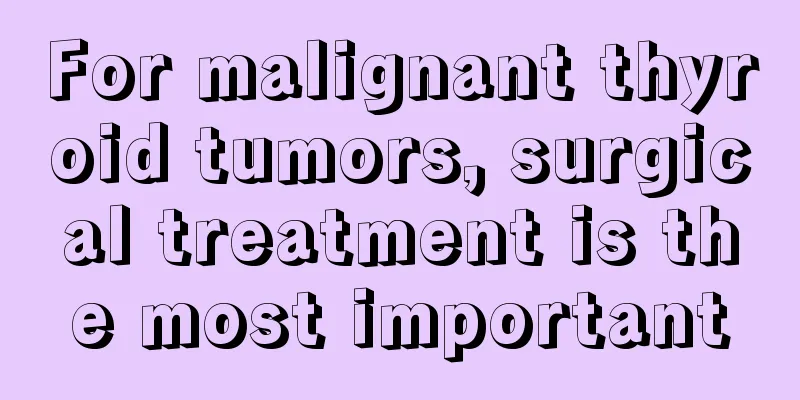For malignant thyroid tumors, surgical treatment is the most important

|
Malignant thyroid tumor is a common cancer. The incidence of this disease is related to region and gender. There are more male patients. Patients will experience symptoms such as palpitations and diarrhea and need timely treatment. The most common treatment is surgical removal of the thyroid gland. 1. Surgical treatment of thyroid cancer includes surgery on the thyroid itself and clearance of the cervical lymph nodes. There is still disagreement on the extent of thyroid resection and there is a lack of evidence from prospective randomized controlled trials. However, complete tumor resection is very important. Meta-analysis data suggest that whether the tumor is completely resected is an independent prognostic factor. Therefore, even if the differentiated thyroid cancer is smaller than the lobe, resection is inappropriate. The smallest scope is the resection of the gland lobe and isthmus. Up to total thyroidectomy. The trend in the extent of thyroidectomy is towards more extensive resection. There is evidence that recurrence rates are lower after near-total or total thyroidectomy. The 30-year recurrence rate after lobectomy in low-risk cases is 14%, while that after total thyroidectomy is 4%. Generally, there is not much controversy about the scope of the first surgery for patients in the high-risk group. It has been reported that the local recurrence rate after lobectomy in TNM stage III cases is 26%, and the local recurrence rate after total thyroidectomy is 10%. There is no difference between total thyroidectomy and near-total thyroidectomy. The advantage of extensive surgery is a lower rate of local recurrence. The main disadvantage is an increase in short-term or long-term complications after surgery. Lobectomy rarely causes recurrent laryngeal nerve damage and severe hypoparathyroidism rarely occurs. 2. Recently, many scholars believe that age is an important factor in dividing low-risk and high-risk patients and select treatment principles based on low-risk and high-risk groups. For patients in the low-risk group, lobectomy and isthmus resection can achieve the treatment goal if there is no tumor at the resection margin. For patients in the high-risk group, it is appropriate to adopt near-total or subtotal resection of the affected lobe and the contralateral lobe. The operation can also be designed according to the clinical characteristics of the tumor. Is lobectomy + isthmus resection suitable for low-risk patients with tumors less than 1 cm in diameter and clearly confined to one lobe of the thyroid gland? Is total thyroidectomy + isthmus resection + contralateral near-total thyroidectomy suitable for patients with tumors greater than 1 cm in diameter and more extensive unilateral papillary carcinoma with lymph node metastasis? Is total thyroidectomy suitable for patients with highly invasive papillary and follicular carcinomas, obviously multifocal bilateral lymph node enlargement, tumors invading surrounding neck tissues or with distant metastasis. The lymph node metastasis rate is higher in patients under 15 years old or over 45 years old, reaching 90%. Total thyroidectomy should be considered for this group of cases. |
<<: Is a malignant tumor cancer? Early treatment is the key
>>: What can low-gluten flour be used for? Low-gluten flour is actually used to make this
Recommend
What is the therapeutic effect of potassium chloride injection?
Potassium chloride injection is a relatively comm...
How to replenish blood for anemia
Anemia is a common clinical problem. Many disease...
What is cardiac arrest
When it comes to the professional term "anti...
Lack of rest makes my heart uncomfortable
There are many reasons for a bad heart, such as p...
How to take care of lung cancer patients in daily life? Lung cancer patients should pay attention to this when dining
Pay attention to the dining environment of lung c...
What kind of anti-inflammatory drip should be used for synovitis
The causes of synovitis are very complex. When sy...
How to treat blurred vision? Teach you four methods to easily treat blurred vision
Sometimes we may encounter blurred vision, and we...
How long can you live after thyroid cancer surgery
Some patients with thyroid cancer hesitate when t...
What to do if you have a throat hemangioma?
Hemangioma is a benign tumor and vascular malform...
What is the difference between obstructive pneumonia and lung cancer?
Lung cancer is a malignant tumor that manifests a...
How much does it cost to treat nasopharyngeal carcinoma? What should I eat after chemotherapy for nasopharyngeal carcinoma?
How much does it cost to treat nasopharyngeal can...
What are the harms of smoking among teenagers? It will affect these four aspects
The physiological systems and organs of adolescen...
What kind of pillow is good for the cervical spine?
Many people may experience stiff neck at ordinary...
How to remove oil stains from clothes
Every time I wash clothes, I feel depressed when ...
Why does my face bones hurt after chemotherapy and radiotherapy for nasopharyngeal carcinoma?
Why does my facial bones hurt after chemotherapy ...









